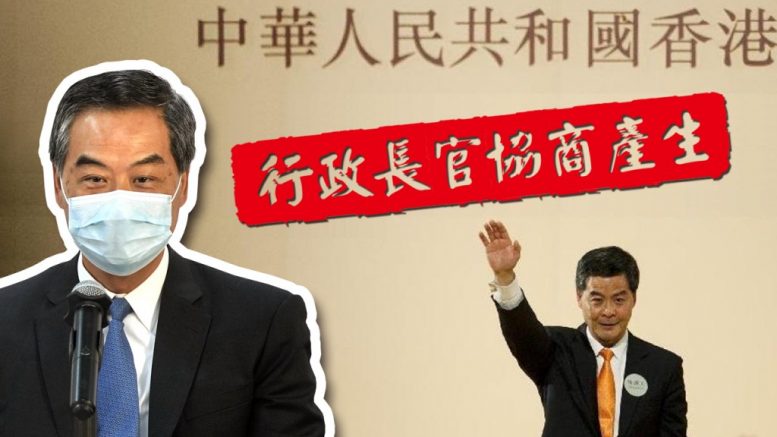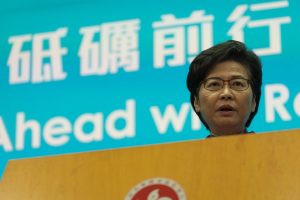By Chris Yeung —
Ex-chief executive Leung Chun-ying is known for his penchant for arguing. Cynics would say sophistry.
But when he stirred up an argument about picking the chief executive by consultation instead of election, he did it not just for argument’s sake. It is plausible he is paving the way for his return to the Government House. Believe it or not.
Leung was out of job after he finished his five-year term in 2017, the first SAR chief to have only done one term. He was elevated to the state leader-level, being one of the 24 vice-chairmen of the Chinese People’s Political Consultative Conference, dubbed the biggest political vase on Earth.
Honourable though it sounds, the reality is that Leung has no power to make such things as universal mandatory virus tests in Hong Kong happen. His discord with her successor Carrie Lam Cheng Yuet-ngor over a string of issues including the handling of teachers alleged of professional misconduct has become increasingly open – and ugly.
The latest bone of contention over whether chief executive should be elected or named by consultation is arguably the most important one because the stakes are high.
Put simply, he seems to stand a better chance of success if the next chief executive is chosen through consultation, presumably led by Beijing, instead of election by the Election Committee. As for Lam, she no doubt prefers putting her bet on the 1,200-member electoral body than on the central authorities composed of a web of visible and invisible power organs.
The jockeying for the top post, scheduled for spring 2022, seems to have already started last month when speculation grew that the National People’s Congress Standing Committee would revamp the city’s election system. It was said to be aimed for eliminating any chance of the pro-democracy force in causing troubles in the process of selection of the chief executive.
In addition to disqualifying pro-democracy district councillors, press reports said the NPC standing body would restructure the 1,200-strong Election Committee.
Official statements issued by the NPC body at the end of their meetings last month and this month made no mention of any Hong Kong-related items.
It was amidst deepening confusion about Beijing’s plan to revamp the election committee system that Leung whipped up a debate on the consultation model. He argued the chief executive does not necessarily have to be elected. Consultation is also legally OK, he said, citing the Sino-British Joint Declaration and the Basic Law.
Basic Law Article 45 says the chief executive shall be selected by election or through consultation held locally. The selection method shall be specified in light of the “actual situation” in Hong kong and in accordance with the principle of gradual and orderly progress.
The specific method for selecting the chief executive is stipulated in Basic Law Annex I only contains electoral arrangements, with nothing on consultation. If consultation is an option, it exists in name, never in substance.
That Leung is attempting to turn a nominal option to a real selection method makes a mockery of the principle of “gradual and orderly progress” of domocratic election. All in the name of the “actual situation” in the city.
Claiming threats of external hostile forces colluding with the democrats to back a pro-independence chief executive, Leung and his supporters argued any talk of election in times of turmoil is silly.
Without naming Leung, Lam backed electing the chief executive. Her view was echoed by Executive Council convenor Bernard Chan.
Leung and the mainland-funded media and Sing Tao Daily News, a pro-establishment newspaper run by CPPCC Standing Committee member Charles Ho, refuted and argued the consultation model is worth public discussion.
Though not known as a fan of Carrie Lam, former Legislative Council president Tsang Yok-sing weighed in. He said Leung has selectively interpreted Article 45, saying it will be a move backwards if the chief executive is selected through consultation.
The battle line is drawn.
With the annual two-sessions, namely CPPCC and NPC, scheduled for early March nearing, the debate over ways of selection of the next chief executive within the pro-establishment camp is heating up.
This is despite the fact that the pro-democracy force is facing disintegration following an hardened crackdown by the central government and the Lam administration. It could not possibly make waves in the chief executive race in the foreseeable future.
Seen from that light, it could not be more absurd that the democrats are being made a formidable threat by people like Leung and the pro-Beijing camp for them to argue even “small-circle, highly-manipulated” chief executive election is too risky to play.
That is no doubt the biggest election fraud in the history of the city’s ill-fated democratic development.
This article was first published on Apple Daily website on Jan. 27.



Be the first to comment on "If you cannot win an election, kill it"